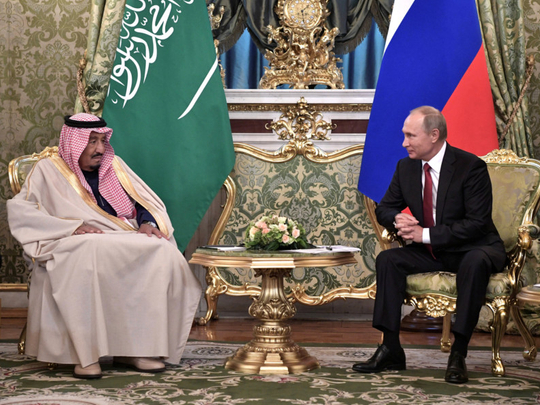
Riyadh realises very well that solidifying its ties with Moscow does not mean abandoning its historic ally, the United States, wrote London-based Pan-Arab paper Asharq Al Awsat. “The Riyadh-Washington ties are much deeper and more important strategically. Improving ties with Russia means that the kingdom is seeking national interests away from narrow alliances in their traditional sense. The visit of King Salman to Moscow has opened the doors wide for a meeting of Saudi and Russian visions. No one can prevent Riyadh from seeking contact with influential world powers in order to improve its interests, partnerships and investments. This will in turn garner it additional support and allow it to preserve its current alliances and balances, which would serve its security and stability. It will also preserve regional and international security and stability.”
King Salman’s landmark visit to Russia has definitely opened new horizons in the troubled Middle East situation, said Lebanon’s Daily Star. “Granted, the two states are the area’s largest oil producers and have for years cooperated on stabilising the market, but this visit defines the opportunities for clearer future cooperation and opens the way for multibillion-dollar investments and trade exchanges. It is a good omen that these two heavyweights have moved to act as honest brokers or mediators to bridge difference where needed; in the case of Syria in accordance with the decisions made at the United Nations-sponsored talks in Geneva. The visit undoubtedly heralds a new dawn for the region and its grievances, and the expected result should touch on the aspirations of its people without any hurdles. Hopefully, it will succeed in ridding the area of the dark clouds that marred its skies for far too long.”
Netanyahu, a bigger obstacle
Israeli Prime Minister Benjamin Netanyahu has never supported a two-state solution and his rhetoric to this effect has been disingenuous, said the Saudi Gazette. “He has made explicitly clear that he could never, ever, countenance a fully sovereign Palestinian state in the West Bank ... US President Donald Trump has said many controversial things, but one of his most recent comments, as provocative as it is, happens to be very true: Netanyahu is a bigger obstacle to the Middle East peace process than the Palestinian leadership. The White House denied the claim, but the Haaretz newspaper said the account was backed up by seven different western and Israeli sources who were either at the meeting or briefed on it afterwards. All these sources could not all have been wrong.”
The UAE’s Al Khaleej questioned how Trump would succeed in forging peace between Palestine and Israel when other US presidents have tried and failed. “Their failure is not attributed to the Arabs or Palestinians, but rather to Israel, because it insists on imposing its racist, expansion and colonial policies and refuses to recognise the rights of the Palestinians. It seems that Trump is very optimistic about his ability to forge peace between Palestine and Israel, and his optimism is quite difficult to comprehend ... Trump can only realise his goal for peace if he exerts pressure on Israel to recognise the rights of the Palestinian people ...”





_resources1_16a31069e4e_small.jpg)



